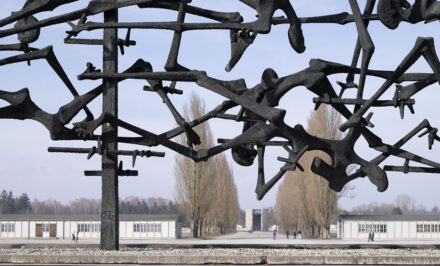Sarah-Leah Pimentel. The events that have taken place in Cape Town, South Africa over the last few days are a poignant starting point for our reflection in the third week of Lent. Devastating fires destroyed more than 4,000 hectares of natural vegetation along the mountain range in the southernmost tip of South Africa. The fire began unexpectedly in the night on a small section of the mountain near my house. Three days later, everywhere you looked all one could see was fire and billowing smoke. As the firefighters doused the flames and the smouldering embers died, the mountains looked more like a desolate lunar landscape than the home of the famous fynbos.
Yet, despite this devastation, botanists are reminding us that the fynbos — the natural vegetation of this area — can only reproduce if it is exposed to fire. It is normal for fires to occur every 10-15 years to allow the vegetation to renew itself. It is also a natural way of culling alien plants that don’t belong in the area and strangle the fynbos. Nature conservationists predict that this same barren landscape will be teeming with new life when spring comes in September.
“The outward conditions for growth are all sorts and degrees of difficulties, continual inner and outward battles”
In our lives too, it’s the trial of fire that deepens our faith and produces hope. Disasters, difficulties and suffering are often beyond our control. They occur suddenly and threaten to completely change the landscape of our lives. All of these things shape our spirituality. So do the religious, social and political contexts in which we find ourselves.
Fr. Kentenich reminds us that in every Christian life, we will encounter difficulties and will have battles to fight. Every life comes with its own suffering: broken relationships, illness, financial difficulties, spiritual battles, battles within ourselves, disappointments of life, loneliness…We might ask, why do we need these things in order to grow in faith?
Suffering is a call to recognize our weakness
 Because we’re human and because God knows us. He knows that when the going is easy, we forget about him. We forget him because we are perfectly capable of going on our own strength. But then, when like Job, everything is pulled out from under our feet, that’s when we realize that we are not almighty and all powerful. Our suffering is a call to recognize our weakness. And in our weakness we reach out to God who strengthens us. St. Paul expresses this really well: “‘My [God’s] grace is sufficient for you, for my power is made perfect in weakness.’ Therefore I will boast all the more gladly of my weaknesses, so that the power of Christ may rest upon me.” (2Cor 12:9)
Because we’re human and because God knows us. He knows that when the going is easy, we forget about him. We forget him because we are perfectly capable of going on our own strength. But then, when like Job, everything is pulled out from under our feet, that’s when we realize that we are not almighty and all powerful. Our suffering is a call to recognize our weakness. And in our weakness we reach out to God who strengthens us. St. Paul expresses this really well: “‘My [God’s] grace is sufficient for you, for my power is made perfect in weakness.’ Therefore I will boast all the more gladly of my weaknesses, so that the power of Christ may rest upon me.” (2Cor 12:9)
This explanation might suggest that God is a cruel and selfish God who tries to get our attention by making us suffer. Nothing could be further from the truth. When we view our suffering in the light of the Christ’s Passion and Resurrection, then it becomes a vehicle of hope, much like the grey ash on Cape Town’s mountains will become the healthy soil for a beautiful spectacle of new life and hope in a few months’ time.
Suffering is transformed by the Cross
Our parish priest explained that our suffering is transformed by the Cross. Christ suffered on the Cross and that suffering is what brought us all redemption and eternal life. The death on Golgotha was transformed into life for all eternity.
Similarly our own suffering is an opportunity to be transformed by God’s grace and it is also an encouragement. Jesus suffered immensely on the Cross. He died as a human being with human emotions, human pain and all of the human questions. Jesus called out to God in the words that we often use when we feel completely abandoned: “My God my God, why have your forsaken me?” But even when he felt most abandoned, he trusted in God’s love, such that his last words were “Father into your hands I commend my spirit.” We too, are called to entrust ourselves to God despite the suffering of our present situation.
God’s promise: He will never give us a burden we cannot bear
God did not give him a burden he could not bear. Similarly, the Scriptures tell us the same thing: “God is faithful, and he will not let you be tempted beyond your ability, but with the temptation he will also provide the way of escape, that you may be able to endure it.” (1Cor 10:13).
Reflection: What are the crosses that I bear? Which are the fires that sweep through my life and leave me vulnerable? What are the internal battles of doubt, addiction or bad habits that I battle with? In my difficulties have I been able to trust that God will protect me, or do I blame him for the things that have gone wrong in my life? Do I actively seek out Jesus in my troubles, or do I forget that he has walked this way before to show the way for me?
Prayer:
Lord we take heart at your promise that in our trials and difficulties, you are always there, giving us what we need to overcome our suffering and grow into new life with you. “Count it all joy, my brothers, when you meet trials of various kinds, for you know that the testing of your faith produces steadfastness. And let steadfastness have its full effect, that you may be perfect and complete, lacking in nothing. If any of you lacks wisdom, let him ask God, who gives generously to all without reproach, and it will be given him. But let him ask in faith, with no doubting, for the one who doubts is like a wave of the sea that is driven and tossed by the wind.” (James 1:2-8)
















Thank you again for inspiration for this Lenten journey. We are praying for those affected by the fires there.